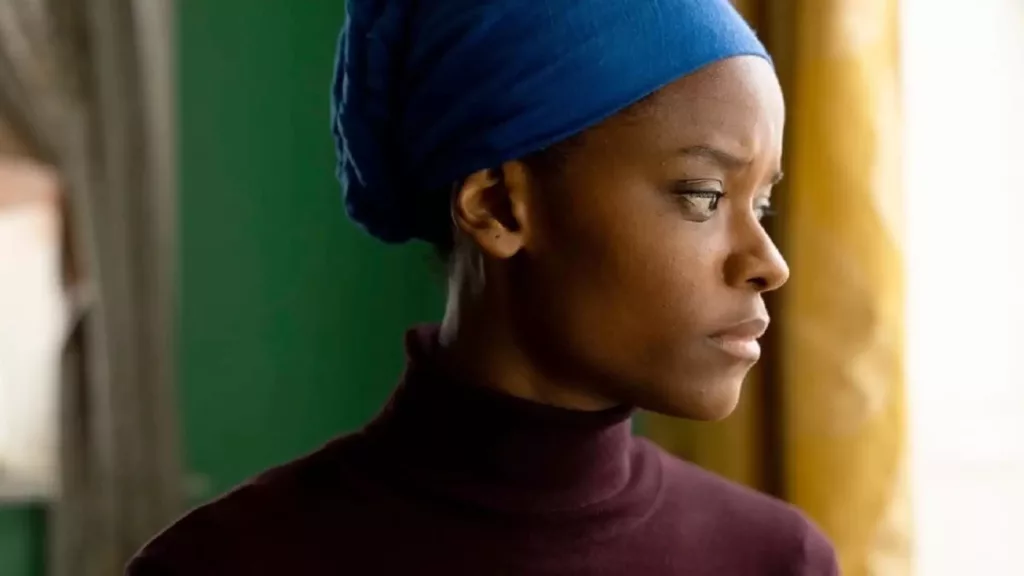Small kindnesses can lighten even the darkest of days. For Aisha, a young Nigerian woman seeking asylum in Ireland, such fleeting moments of warmth offer brief respite from an ordeal that constantly tests her resolve. Writer and director Frank Berry immerses us in Aisha’s struggles through gripping yet grounded storytelling.
We meet Aisha after she has endured over a year trapped in Ireland’s direct provision system for asylum seekers. Separated from her mother still facing danger back in Nigeria, Aisha resides in a hostel awaiting a decision on her case. There she faces petty obstacles and bureaucratic indifference at every turn. A new job as a night guard, Conor reaches out with empathy, granting Aisha rare moments of companionship. Played with depth by Letitia Wright and Josh O’Connor, their characters’ bond provides solace amid relentless hardship.
Berry paints a moving portrait of immigrant life through day-to-day authenticity. He captures the isolation of Aisha’s limbo with intimate scenes of quiet strength and vulnerability. When obstacles intensify, her perseverance and the simple acts of human kindness that sustain her become all the more poignant. Anchored by its stars’ powerful empathy, the film brings an intensely human face to a complex global issue.
Letitia’s Journey
We first meet Aisha in Ireland after fleeing her home in Nigeria. Two important men in her life, her father and brother, were killed in a violent act of revenge. She’s been seeking safety and asylum in Ireland for over a year now. Still waiting for a decision on her case, Aisha resides in a hostel for asylum seekers.
Each day presents new challenges navigating Ireland’s Direct Provision system. The rules are numerous and the consequences for minor mistakes feel intentionally harsh. Aisha works hard at a local salon, hoping to one day bring her mother to join her in Ireland too. But staying afloat isn’t easy when every little thing can feel designed to push her out.
Despite facing discrimination and busybodies determined to make her life harder, Aisha’s spirit refuses to break. Her quiet strength and dignity impress the new security guard Conor. Where many see only a number, Conor sees Aisha for who she is – a kind woman deserving of respect. As Aisha’s only friend, Conor offers small acts of kindness that help keep hope alive.
But connecting in a meaningful way isn’t simple either. Aisha remains wary of depending on others after all she’s survived. When circumstances force her from the hostel, Aisha loses what little stability she had. Just as her bond with Conor starts to deepen, reality threatens to separate them for good. Through it all, Aisha perseveres in her important battle, even when it seems the whole world is working against her chance to truly find safety at last.
Discussing Difficult Subjects with Care and Empathy
Director Frank Berry tackles complex issues in Aisha but does so in a sensitive manner. He doesn’t dramatize or sensationalize the problems asylum seekers face, instead opting for realism drawn from lived experiences. Berry aims to inform without intensifying distress.
This style is mirrored in Tom Comerford’s cinematography. Scenes capture the constrained tedium of forms, lines and bureaucratic procedures that govern asylum applications. However, Comerford finds poignancy too, framing shots to convey longing. Whether it’s a character alone at a bus stop or simply gazing from a flat’s window, these images linger with impact equal to direct statements.
Subtlety also defines Daragh O’Toole’s score. Some filmmakers lean heavily on music to manipulate emotions but here it plays a supporting role. O’Toole incorporates African sounds yet does so sparingly, recognizing some truths are troubling enough without amplification. His restraint honors the resilience of those navigating complex personal traumas amid stifling public systems.
By addressing difficulties from a place of care rather than condemnation, Berry’s film highlights shared hopes over political talking points. Viewers leave thoughtful rather than reactionary, with amplified empathy for all people striving to build safe, dignified lives. Some themes defy easy answers but nuanced depictions promote understanding better than simplistic reactions. Overall, Aisha elevates empathy through empathetic storytelling.
“Join the magical world of live-action role-playing at Wayfinder camp in our We Can Be Heroes review. Discover how imagination and friendship help teens find their true selves in this heartwarming documentary.”
Spotlight On Two Standout Performances
Letitia Wright’s subtle but compelling work as Aisha anchors this film. Though much of her inner life remains unspoken, Wright communicates volumes through gestures, expressions and body language alone. She holds herself with quiet courage even amid countless frustrations, and her eyes frequently speak of depths of sorrow just begin to surface.
Whether awaiting judgment in a sterile interview or sharing shy smiles with Conor, hints of resilient spirit and profound hurt linger in her gaze. Despite ongoing struggles, Aisha strives to help others in small ways and keeps trace of dignity. Through it all, Wright imbues her with an empathy that invites our own.
As Conor, Josh O’Connor brings compassion and nuance to what could have been a two-dimensional role. Conor’s shy warmth and eager desire to right wrongs come across as surprisingly genuine. His visible care for Aisha feels free from ulterior motives, and the ghosts of his past leave him with boyish insecurity underneath.
Scenes of the two opening up to each on the bus or in hushed conversation glow because of O’Connor’s ability to make Conor as vulnerable as he is vital source of light for Aisha. Whether laughing together or enduring an uncertain farewell, the actors create a rare portrait of cross-cultural intimacy that lingers in memory.
Both performances prove transformative. Wright and O’Connor lift this story from worthy drama to deeply impactful film through emotionally rich and multifaceted work. Their talents ensure Aisha’s humanity resonates all the more after the end credits fade.
Discover the inspiring story of Terry Masear’s dedication to hummingbird rehabilitation in our Every Little Thing review. Learn how her compassion and care transform the lives of these delicate creatures, offering a profound connection between humans and nature.
Refuge and Resistance
The uphill battle waged by Aisha, a young Nigerian woman seeking asylum in Ireland, lays bare a system seemingly designed to break the human spirit. Escaping violence in her homeland, she now faces daily frustrations and fresh traumas inflicted through the indifference of those controlling her fate.
Aisha finds temporary refuge at an accommodation centre, yet is treated more as a prisoner than guest. Strict regulations aim to keep residents oppressed, from bans on using appliances to punishments for minor infractions. Her attempts to improve conditions, like providing halal meals, are seen as threats to the manager’s control. Through it all, Aisha perseveres with quiet resolve.
Even when recounting past horrors to officials holding the key to her future, Aisha knows full disclosure risks further trauma with no guarantee of aid. She strategizes each word, awareness that a single misspoken detail could doom her case. Yet for all Aisha shares, the interviewer sees only absence – of paperwork, corroboration – disregarding how violence strips its victims of such tools for survival.
In this turmoil, human qualities like compassion become acts of resistance. When the lonely security guard Conor extends kindness to Aisha, their bond offers refuge for two souls in need. Finding glimpses of joy and solidarity emboldens Aisha to push back against mistreatment and advocate for others. Though relationships within this system carry risks, the hopeful moments Aisha and Conor share sustain them.
Amid a machine indifferent to individual lives, Aisha refuses to be broken or become a number. Through quiet defiance and relying on her own dignity, she continues resisting all efforts to destroy her spirit – demonstrating how the indomitable human will can overcome even bureaucracy’s cruel designs.
A Difficult Path to Protection
The system of Direct Provision portrayed in Aisha seems designed to wear refugees down rather than offer refuge. Through Aisha’s eyes, we witness the daily hardships imposed – from bureaucratic roadblocks to petty rules meant to provoke infractions. She’s constantly on edge, never staying in one place for long as the system shuffles her around.
It’s easy to see how this prolongs the asylum process, keeping people in a state of uncertain limbo for years. Aisha has already been waiting two years at the start of her story. A bleak housing layout where personal space is limited doesn’t help stressed occupants forced to live in close quarters. The manager seems to relish lording over residents, eager to discipline any infraction, no matter how minor.
Even services meant to help carry risks. Aisha is still reluctant to fully confide traumatic details, understandably protective of difficult memories. Yet the implication is that fully recounting every grizzly moment may be what’s required for approval. The system appears unwilling to make allowances for the trauma it is also subjecting applicants to through prolonged uncertainty and lack of agency over their circumstances.
Though Berry leaves some questions unanswered, his portrayal shines a light on how this system could reform to show more compassion. Small gestures of patience and understanding could go a long way in easing suffering for those risking everything to start anew. A more thorough consideration of individual circumstances beyond checklists might yield fairer decisions. If those seeking shelter on our shores leave only with deeper scars, have we truly fulfilled our responsibility to protect the vulnerable?
The Quiet Power of Aisha
Letitia Wright delivers one of her greatest performances to date in Aisha. Through subtle expressions and gestures, she brings an immense depth and humanity to her character. We experience every slight against her dignity as deeply as she does. Likewise, Josh O’Connor imbues Conor with warm empathy that provides a rare ray of hope.
Their bond grows quietly but touchingly against the bleak backdrop of Ireland’s Direct Provision system. Writer-director Frank Berry draws us into Aisha’s daily struggles with documentary-like authenticity. It’s impossible not to feel outraged by the petty barriers and bureaucratic indifference she faces. Yet Aisha perseveres with admirable resilience.
Berry never sensationalizes the trauma that drove Aisha from Nigeria or the limbo she endures seeking asylum. He trusts the power of understatement to personalize her plight. Though it asks much of viewers to sit with her loneliness and frustration, Aisha’s journey remains gripping. It impossible not to root for even the smallest victories in her struggle to find community and safety.
While not an easy watch, this is a film that lingers in the mind. At its heart is a reminder of our shared humanity and the real people behind global issues. Through sheer force of empathy, Aisha becomes a call for compassion that we would do well to heed.
The Review
Aisha
Aisha is a profoundly moving portrait of resilience that yields haunting insights through restraint. Director Frank Berry draws us deeply into the emotional experience of one woman's struggle in a way that personalizes the broader crisis facing so many displaced people today. Anchored by tremendous performances from Letitia Wright and Josh O'Connor, this is an empathetic and thought-provoking piece of immigrant-driven cinema that deserves wider acclaim.
PROS
- Authentic and realistic portrayal of asylum process
- Intimate focus on the human stories and emotions
- Heartbreakingly empathetic central characters
- Subtle yet powerful performances from Wright and O'Connor
- Sheds needed light on an important issue
CONS
- Slow pacing may frustrate some viewers
- Some may find storyline emotionally draining
- Relationship subplot doesn't fully develop character depths
- Lack of resolution could disappoint audiences





















































